
You may feel overwhelmed with the options when it comes to long-term care for your aging loved one. There are many options. These include Assisted living, Community-based Care, Alzheimer's Care, and Homecare. While it can be difficult to choose the right option, there are some things you should keep in mind. In this article, we will explain some of the different options available for elder care.
Assisted living
Assisted living for seniors is a community that assists with daily activities. This includes personal care, housekeeping, and meals. The residents can take part in hobbies and social activities. They can also pursue their intellectual or spiritual interests. Healthcare is available around the clock at most facilities. Residents are assigned care plans, which are reviewed on an annual basis. Residents with special needs or medical conditions may be referred for higher care.
Some costs associated with assisted living may be covered by Medicaid. Currently, it covers the health care costs of 75 million Americans, including low-income adults, children, pregnant women, the elderly, and people with disabilities. Medicaid eligibility requirements and the application process vary from state to state. For more information, please contact your state's Medicaid assistance agency. Medicare doesn't cover assisted living costs. If you are eligible for Medicaid, you have many other options.

Home care
As your loved person ages, it is important to make decisions about what long-term home care you want. As natural aging can require assistance, so will illness and the progression to dementia. Here are some tips and resources that can help you make the right decisions. Here are some tips to help you find the right long-term care provider. You can also find referrals from family members and friends.
Seniors may feel more at ease staying at home. This familiarity can help them cope with illness or loss. The best decision is to remain in the same home as their family. Many times, people move out of their house only after experiencing a major health problem or an unexpected loss. To ensure your loved one is comfortable, it is important that you plan in advance. This will also ensure that the family can visit and stay close to them.
Community-based services
In communities around the country, more than a million direct-care workers provide home health and personal care services for the elderly. As the population ages, so will the need for community-based long term care services. Eighty percent of adults prefer receiving their care at home to an institution. Community-based services range from personal care, home health modifications, and transportation to meal and adult day services.
These services are provided by loved ones or by paid professionals and provide long-term support to the elderly. These services can be an alternative to nursing home care, as they are more affordable and flexible. Services they offer include housekeeping, supervision, as well as a minimum of three meals per day. These homes are licensed by the State Department of Health. Most family-type facilities accept these programs. This is a good option for anyone who is unable or unwilling to move into a nursing home.

Alzheimer's Care
If you're responsible for elderly loved ones, it is imperative to understand how to provide proper Alzheimer's care for the ailing. For example, the condition can cause impaired bladder control, leading to incontinence. Incontinence is an embarrassing problem that can be difficult to deal with and can be a sign of an underlying physical illness such as a urinary tract infection. There are many methods to provide Alzheimer's Care for the Elderly.
You can start by listing all the medications that have been taken by your patient. A majority of pharmaceutical companies offer prescription assistance programs (PAP) which provide free medication. If you have an insurance policy, you can request co-payment waivers. Make sure you list all medication taken by your loved one and then search the database to find assistance programs. A list of assistance programs will be available to help pay for the medications of your loved one.